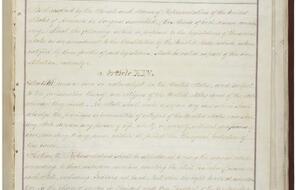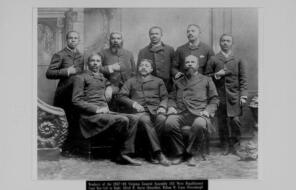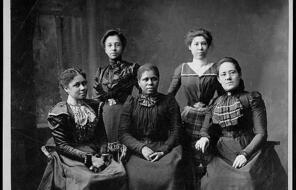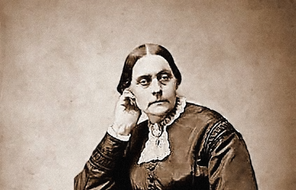What Is Ethical?: The Case of Polaroid
At a Glance
Language
English — USSubject
- History
- Democracy & Civic Engagement
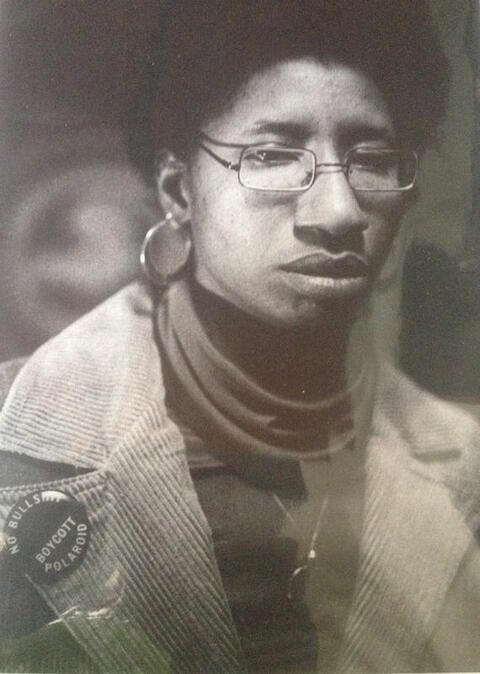
Caroline Hunter, co-founder of the Polaroid Revolutionary Workers Movement, wears a “No Bullshit, Boycott Polaroid” campaign button, advocating against Polaroid’s contract with the Apartheid government in South Africa.
Western businesses, especially in Britain and the US, had long invested in South Africa. By the mid-1980s, British companies were responsible for 40% of all foreign investment in South Africa. 1 By 1977, 312 American companies were doing business in South Africa, worth over $6.7 billion (in 2016 dollars), making an average profit of 12%—over double the rate of companies operating in the US. 2 This high rate was in part the result of South Africa’s enforced availability of cheap black labor. Among these companies was Polaroid, the Apple of its day: hip, highly profitable, and with a huge world market.
In 1970, at Polaroid’s headquarters, two African American workers, Caroline Hunter and Ken Williams, inadvertently discovered that the company had a business in South Africa selling Polaroid products. The company also had a contract with the apartheid government to produce the photos used in passbooks, documents designed to control where Africans could work and with whom they could live. Hunter and Williams established an organization, the Polaroid Revolutionary Workers Movement (PRWM). Their goal was to force Polaroid out of South Africa. Hunter and Williams stated their position in a number of flyers and in a 30-page manifesto. The excerpt below comes from this booklet, which calls for a complete withdrawal of all investment and sales in South Africa (a strategy called “divestment”).
Brothers and Sisters:
. . . We see the South African apartheid system as the symbol of the many ‘inhumanities’ in the United States. We cannot begin to deal with racism in Polaroid or in the U.S. until Polaroid and the U.S. cease to uphold and support apartheid. Black people in South Africa are enslaved and dehumanized in order to insure the security of apartheid and the capitalists’ margin of profit. The United States and its corporate society have made explicit its intentions of profits at any human expense. We demand that we no longer be used as tools to enslave our brothers and to insure corporate profits.
. . . [T]he Movement presented Polaroid Corp. with the following demands:
- that Polaroid announce a policy of complete disengagement from South Africa. We believe that all American companies doing business there reinforce that racist system.
- that Polaroid announce its position [on] apartheid publically, in the US and South Africa.
- that Polaroid contribute profits earned in South Africa to the recognized African liberation movements.
Polaroid has refused to meet with the PRWM or recognize the demands. On October 27th, the PRWM called for a world-wide boycott of Polaroid.
By demanding complete disengagement, the workers at Polaroid are acting in solidarity with calls by African liberation movements . . . . They have concluded that only economic withdrawal can begin to erode, divide and weaken South Africa’s white front of oppression. . . . 3
In response, Polaroid studied its options and declared that it opposed apartheid unequivocally. Arguing that it could combat apartheid from within the country, however, Polaroid stated that it would continue to do business with private companies, just not with the South African government. (It was revealed in 1977 that Polaroid films were being sold to the government by the company’s distributor, Frank & Hirsch.) Polaroid also offered a few remedial, experimental actions, including raising salaries and providing funds for black students, teacher training, and training programs for black employees to take “important jobs within their companies.” But Polaroid fired Hunter and Williams.
The Polaroid Corporation took out full-page ads in ten major US newspapers, titled “An Experiment in South Africa,” to make its position known. Excerpted below are the key arguments put forward by the corporation for its approach.
Recently a group has begun to demand that American business stop selling in South Africa. They say that by its presence it is supporting the government of the country and its policies of racial separation and subjugation of the Blacks.
We did not respond to the demands [of this group]. But we did react to the question: is it right or wrong to do business in South Africa?
The committee of Polaroid employees who undertook this study included fourteen members—both black and white—from all over the company. The first conclusion was arrived at quickly and unanimously. We abhor apartheid.
They addressed themselves to a single question. What should Polaroid do in South Africa? We rejected the suggestion that we ignore the whole question and maintain the status quo.
It was decided to send four of the committee members to South Africa. Since this group was to include two black and two white members, it was widely assumed they would not be granted visas. They were.
The group returned with a unanimous recommendation.
For the time being we will continue our business relationships there (except for sales to the South African government, which our distributor is discontinuing), but on a new basis which Blacks there with whom we talked see as supportive to their hopes and plans for the future.
First we will improve dramatically the salaries and other benefits of their nonwhite employees. Our business associates will initiate a well-defined program to train non-white employees for important jobs. We believe education for the Blacks, in combination with opportunities now being afforded by the expanding economy, is a key to change in South Africa. We will commit a portion of our profits earned there to encourage black education.
Why have we undertaken this program? To satisfy a revolutionary group? No. South Africa alone articulates a policy exactly contrary to everything we feel our company stands for. We cannot participate passively in such a political system. Nor can we ignore it. That is why we have undertaken this experimental program. 4
These positions were representative of the basic positions that emerged in this period, with the broader international anti-apartheid movement on the one side and the interests of Western businesses on the other. Through the 1970s and 1980s, however, the international divestment movement gained influence and began to change not only Western business practices but also the policies of many Western governments. In Britain, public pressure forced Barclays Bank to divest; Canada’s, Bata Shoes also pulled out.
Connection Questions
- What dilemmas did this story expose for corporations that were doing business in South Africa?
- Regarding the Polaroid Corporation’s full-page ad campaign and rationale: What decision-making process did the company use to arrive at its decision on doing business in South Africa? What changes did Polaroid make in South Africa? What results did the company expect to achieve in opposing apartheid? How did Polaroid defend its decision to maintain its presence in South Africa? What do you think of that decision? Do you agree with it? Why or why not?
- What arguments and evidence did the PRWM offer in its call for Polaroid’s withdrawal from South Africa? Do you agree? Why or why not?
- Think more deeply about the arguments offered above for each position. Is there enough evidence to support each view? If you believe that you require additional evidence to be convinced of one side or the other, what evidence would you want to see?
- 1Steve Lohr, “Barclay’s Pullout: The Pressure Grew,” New York Times, November 24, 1986.
- 2Africa Fund, “South African Fact Sheet,” 1977 (New York: American Committee on Africa).
- 3Barbara B. Brown, “The US Responds to Apartheid: Polaroid,” Boston University, accessed March 21, 2017.
- 4Brown, “The US Responds to Apartheid: Polaroid.”
How to Cite This Reading
Facing History & Ourselves, “What Is Ethical?: The Case of Polaroid,” last updated July 31, 2018.
This reading contains text not authored by Facing History & Ourselves. See footnotes for source information.






